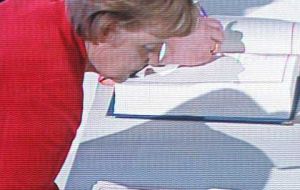MercoPress. South Atlantic News Agency
With the Lisbon Treaty EU prepares for active global role
 "From this old continent, a new Europe is born," said Pte. Barroso
"From this old continent, a new Europe is born," said Pte. Barroso European Union leaders have signed a treaty in Portugal's capital that is expected to greatly alter the way the 27-nation body operates. The treaty creates an EU president and a more powerful foreign policy chief.
The document, signed at a ceremony at Lisbon's historic Jeronimos Monastery, also scraps veto powers in many policy areas. It is a replacement for the EU constitution, which was abandoned following French and Dutch opposition. EU leaders insist that the two texts are in no way equivalent. But the Lisbon treaty incorporates some of the draft constitution's key reforms, and several governments face domestic pressure over the document. In a speech before the signing, European Commission President Jose Manuel Barroso called on European leaders to use the treaty to make freedom, prosperity and solidarity an everyday reality for all European citizens. "From this old continent, a new Europe is born," he said. Portuguese Prime Minister Jose Socrates, whose country holds the rotating EU presidency, said the treaty would create a more modern, efficient and democratic union. "The world needs a stronger Europe," he said. The leaders signed the treaty, translated into the EU's 23 official languages, using specially engraved silver fountain pens as a choir sang Beethoven's Ode to Joy. UK Prime Minister Gordon Brown signed the treaty later in the day after missing the ceremony, citing a prior engagement in the British parliament. The UK's opposition Conservatives accused Mr Brown of "not having the guts" to sign the treaty, which is politically controversial in Britain, in public. Having started this year with a celebration of its 50th birthday, the EU hopes the signing of the Lisbon treaty will end the serious mid-life crisis brought about by the death of the constitution. There will be a lot of relief, said a senior European diplomat, but also some apprehension about what happens next. Ireland is the only country planning to hold a referendum, but most voters there seem either undecided or indifferent. Parliaments in Britain, the Netherlands and Denmark are also expected to give a turbulent reception to the 250-page text. However, Germany, France and Poland have pledged to be among the first to ratify it, so that the new reforms can come into force in 2009 as planned. The treaty is a slimmed-down version of the European constitution, with a more modest name and without any reference to EU symbols such as the flag and anthem. It is meant to ease decision-making, by scrapping national vetoes in some 50 policy areas, including sensitive ones such as police and judicial co-operation. There will also be a foreign policy chief, controlling a big budget and thousands of diplomats and officials, and a permanent EU president appointed for up to five years. But some already fear that instead of giving Europe a strong single voice in the world, the new posts will only generate more rivalry.




Top Comments
Disclaimer & comment rulesCommenting for this story is now closed.
If you have a Facebook account, become a fan and comment on our Facebook Page!